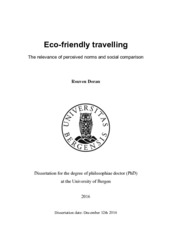| dc.contributor.author | Doran, Rouven | |
| dc.date.accessioned | 2017-01-10T09:18:26Z | |
| dc.date.available | 2017-01-10T09:18:26Z | |
| dc.date.issued | 2016-12-12 | |
| dc.identifier.isbn | 978-82-308-3177-9 | |
| dc.identifier.uri | https://hdl.handle.net/1956/15346 | |
| dc.description.abstract | Tourism can be linked to negative environmental impacts, such as an extensive output of greenhouse gas emissions. But in spite of the increase in public awareness of (as well as positive attitudes towards) the need to reduce such impacts, few people seem willing to adjust their travel accordingly. Moreover, even those who are strongly committed to environmental practices at home are less likely to engage in the respective behaviour while on vacation. The overarching aim of this project was to explore the relevance of perceived norms and social comparison with respect to travel choices that benefit the environment. Paper I explored perceived differences between people’s personal attitudes and a normative standard and whether perceptions of personal attitudes about environmental issues in tourism differ from what is desirable. Results from two studies indicated tendencies among the participants to view their personal attitudes more positively than those of others (measured in terms of attitude judgements of a typical tourist, an average tourist, or tourists generally). Personal attitudes were judged to be congruent with perceptions of what the participants considered desirable. Paper II investigated associations between perceived norm strength and intentions to choose eco-friendly travel options. Results from one study showed that personal norms showed the strongest association with behavioural intentions and that the associations between social norms (injunctive and descriptive) and behavioural intentions were reduced when personal norms were also controlled for. Further analysis provided support for the view that the association between injunctive social norms and behavioural intentions could partly be explained by personal norms. Descriptive social norms remained associated with behavioural intentions even after personal norms were controlled for. Paper III explored social comparison feedback (here: information about one’s own ecological footprint and that of an average reference group member) in relation to indicators of eco-friendly travel choices, namely behavioural intentions and perceived efficacy. One study demonstrated that exposure to unfavourable feedback (i.e., a personal ecological footprint that is relatively worse than that of others) can affect behavioural intentions when in-group identification with the reference group is high: Participants exposed to unfavourable feedback showed stronger intentions to choose eco-friendly travel options than those exposed to non-discrepant feedback when they expressed high, but not moderate or low, levels of in-group identification. Another study failed to replicate these findings and furthermore found no effect of exposure to favourable feedback (i.e., a personal ecological footprint that is relatively better than that of others), with similar findings reported for participants who varied in their level of in-group identification. None of the studies reported effects of social comparison feedback on perceptions of self- and collective efficacy. The overall findings indicate that perceived norms and social comparison could be relevant for travel choices with environmental implications. From a theoretical point of view, the project expands the canon of literature exploring psychosocial factors associated with choices of eco-friendly travel options. It highlights the predictive utility of social and personal norms for explaining individual travel decisions, emphasising the importance of the moral obligations that a person feels towards the behaviour in question. From a practical point of view, the project provides insights into how to improve interventions that are targeted at encouraging travel choices that benefit the environment and about how social comparison might help individual tourists justify their attitude-behaviour inconsistencies. The summary concludes with a discussion of current “blind spots” in the literature, followed by suggestions for future investigations. | en_US |
| dc.language.iso | eng | eng |
| dc.publisher | The University of Bergen | eng |
| dc.relation.haspart | Paper I: Doran, R., & Larsen, S. (2014). Are we all environmental tourists now? The role of biases in social comparison across and within tourists, and their implications. Journal of Sustainable Tourism, 22, 1023–1036. Full text not available in BORA due to publisher restrictions. The article is available at: <a href="http://dx.doi.org/10.1080/09669582.2013.836209" target="blank">http://dx.doi.org/10.1080/09669582.2013.836209</a> | eng |
| dc.relation.haspart | Paper II: Doran, R., & Larsen, S. (2016). The relative importance of social and personal norms in explaining intentions to choose eco-friendly travel options. International Journal of Tourism Research, 18, 159-166. The article is available at: <a href="http://hdl.handle.net/1956/11009" target="blank">http://hdl.handle.net/1956/11009</a> | eng |
| dc.relation.haspart | Paper III: Doran, R., Hanss, D., & Øgaard, T. (2017). Can social comparison feedback affect indicators of eco-friendly travel choices? Insights from two online experiments. Sustainability, 9 (2):196. The article is available at: <a href="http://hdl.handle.net/1956/15494" target="blank">http://hdl.handle.net/1956/15494</a> | eng |
| dc.title | Eco-friendly travelling: The relevance of perceived norms and social comparison | eng |
| dc.type | Doctoral thesis | |
| dc.rights.holder | Copyright the Author. All rights reserved | eng |
| dc.identifier.cristin | 1410573 | |
